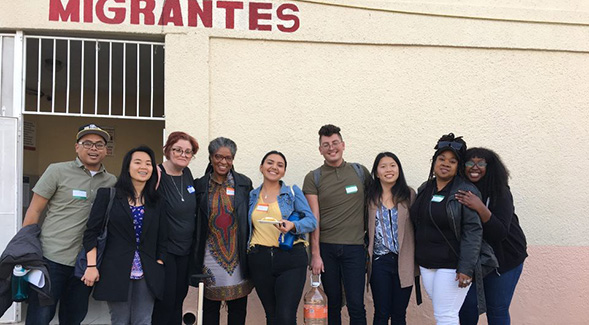Clinical Counseling Students Work to De-stress Border Volunteers
As human-rights defenders respond to a huge increase in the number of asylum seekers, they can wind up needing help, too.

For years, migrants stranded at the U.S.-Mexico border have found help, for the most part, from volunteer activists offering advocacy and assistance with their day-to-day needs. But the recent influx of thousands of Central American asylum-seekers into Tijuana have strained many of the human rights defenders to their breaking point.
Now some San Diego State University clinical counseling students, faculty and alumni are stepping in to help the overwhelmed helpers.
"It's not enough to just talk about these issues—we really wanted to give our students a real opportunity to put what they're learning about community building and their counseling skills into action," said Nola Butler-Byrd, director of the Community-Based Block Multicultural Counseling and Social Justice Education Program. The program prepares licensed professional clinical counselors to work with individuals and communities.
The group formed the Transborder Crimmigration Project, addressing the nexus between criminal law and immigration for local students and communities. The initiative aims to educate the SDSU community and provide counseling assistance to the activists working with migrants in Tijuana.
Trauma and healing
On Jan. 26, 15 students, two faculty members and five alumni from the project crossed into Mexico for a healing event, organized with the migrant rights organization ALMA Migrante. At a Salvation Army center in Tijuana, the group met with about 10 local human rights defenders and conducted a healing circle—a therapeutic space for people to talk about issues of concern to them.
The effort was well-received, along with weighted blankets, a therapeutic tool used to treat anxiety that the group brought.
"What really stunned and terrified me was how much trauma so many of the human rights defenders had experienced,” said Butler-Byrd, an associate professor in the department of counseling and school psychology. “There was one defender who had been kidnapped down there, and had just barely escaped with his life. Despite all that he's still working to try to help people. So it was harrowing but also inspiring to see how courageous and dedicated these people are to try to affect some change."
Lucio Lira, a graduate student in the Community-Based Block Program, said he was inspired to take part because of his own experience as a child of the border region. Born in Los Angeles, Lira grew up in Tijuana before coming to San Diego for high school. He now works in behavioral health.
At the healing circle, “We had one person saying that they need to hide because people are always reaching out to them,” Lira said. “I can see how demanding of a job it is and how much energy it takes. And because of that, they don’t usually take the time for self-care.”
“I could see how important it was to them to have these conversations and the space,” he added. “They really wanted more time.”
To that end, Butler-Byrd said the Project is in talks with ALMA Migrante to schedule another session in April and possibly May.
"I was really impressed by the way the students came together as a team to serve the community in such a loving way,” Butler-Byrd said. “They were anxious about going down there to do it. This is their first year in our program and they were afraid that they might not have what it took to be the transformative counselors that they wanted to be.
“But they worked so well together as a team in a really powerful way."
Upcoming symposium
The Transborder Crimmigration Project is bringing its educational component to SDSU with a free daylong symposium on March 8 at the Conrad Prebys Aztec Student Union Theatre. The event will feature a cultural competency session and speakers from academia and immigration law.
“We decided to bring in some experts from around the country to provide some education,” Butler-Byrd said, “to refute some of the misinformation that is out there about immigrants and the role that they play in our society."
Learn more about the Transborder Crimmigration Project Symposium and a special morning session for faculty, staff and administrators



